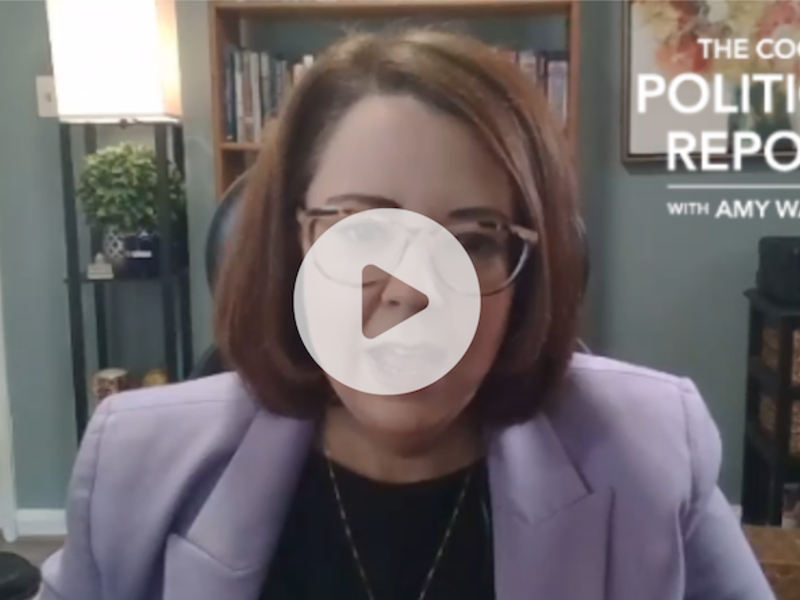
This month was supposed to be all about the 2020 Democrats. The third Democratic debate — and the first since Sen. Elizabeth Warren has propelled herself into a tie for 'frontrunner' status — is on October 15th. Various campaigns have leaked their third-quarter FEC reports, but the real data (on spending, cash on hand, burn-rate) will be available on the 15th as well. The fall is also a time when the Democratic field should narrow even more significantly. Sen. Cory Booker was able to browbeat/guilt/beg donors for enough cash to sustain his candidacy into October. But without some sort of breakthrough can he, or the other low-polling candidates, find enough cash in the cushions to continue through the end of the year?
Thanks to impeachment drama, however, this month is all about Trump and Congress. Instead of playing a starring political role this fall, the 2020 Democrats are now playing a supporting role.
Well, that's true for most of the 2020 candidates not named Bernie Sanders or Joe Biden. Both have gotten attention for the wrong reasons: Sanders for his heart attack, and Biden for the Ukraine controversy.
Thus far, Biden's overall political standing has remained pretty steady. Our friends at NBC's First Read note: "As for Joe Biden, the NBC/WSJ poll finds that his numbers have barely moved since the Ukraine story became news (and since he and his son have gotten caught up in it — without any evidence of wrongdoing). Thirty-three percent of Americans say they have a positive view of the former vice president, while 34 percent have a negative view (-1). In August's NBC/WSJ poll, Biden's fav/unfav rating was 34 percent positive, 38 percent negative (-4)."
Other polling released since the Ukraine call became public have produced similar findings. An early October national Quinnipiac Poll found Biden leading Trump 51-40 (+11). That was a drop from his stronger 54-38 (+16) lead in late August, but not much different from his 53 to 40 percent lead in June (+13). A recent Fox News poll in Wisconsin shows him leading Trump by nine points (48 percent to 39 percent). A poll taken at the end of August by Marquette University Law School also showed Biden with a nine-point lead (51-42) in the state. In other words, despite all the negative attention he's gotten over the past couple of weeks, Biden hasn't collapsed — or even lost ground. Few in Washington, however, think this will continue. They expect to see Biden's numbers and overall political lead drop precipitously.
Even so, the constant focus on impeachment has essentially frozen the primary in place. That's not so great for the candidates polling in the single digits. At next week's Democratic debate in Ohio, impeachment is going to take up a lot of air time: time that was already going to be hard for the lower-polling candidates to come by on a stage packed with twelve Democrats.
A freezing of the field is good for Warren. Even before Ukraine was in the news, Warren was moving up in the polls. With help from Cook Political Report Digital Editor Ally Flinn, I've updated the chart I created back in late August that looked at which candidates were running best in each of the key demographic groups.
What you notice is that in August, Biden (shaded in blue) was ahead in almost every single demographic group. By September and early October, that's no longer the case. The most glaring example is his showing among white voters. Back in August, Biden led all the other Democrats among these voters. Today, Warren (shaded in red) is leading with these voters in every poll except Fox. Among liberal Democrats, Biden and Warren were splitting these voters over the summer. Warren has now taken the lead with this group. Biden still has a solid grip on voters of color, though he saw a drop in his lead in the CNN and Quinnipiac polls.
Biden also still holds a substantial lead with older voters, but it's not as large as it was back in August. Meanwhile, Sanders (in green) is still holding onto support from younger voters.
If there's one warning sign for Warren, however, it's that Democratic voters do not overwhelmingly share her calls for big, bold, structural change.
The foundation of Warren's campaign is that Americans want a fundamental shake-up of the status quo. Americans don't want just a little nip-tuck, she argues, they want big, structural change. The central thrust of Biden's message is the opposite: let's build on the gains of the Obama Administration instead of blowing it all up and starting from scratch.
Three polls, Quinnipiac, NBC/Wall Street Journal and Fox News, have asked Democrats a version of this choice: big and bold (Warren) versus incremental/pre-Trump (Biden). Fox News also asks a version of the question this way: Would you like a candidate to build on the legacy of President Obama or to chart a new and different approach?
Here's how Quinnipiac (9/19-23) phrased the question: "In general, do you want to see the Democratic nominee support policies that would result in minor changes but would be easier to pass into law, or do you want to see the Democratic nominee support policies that would result in major changes but would be more difficult to pass into law?" Fox News (9/15-17) asked: "Will you vote for a candidate who will restore the political system to the way it was Pre- Trump, or a candidate who will fundamentally change how the political system works in Washington?" The NBC/Wall Street Journal poll worded it as would you support a Democratic candidate: "who proposes larger scale policies that cost more and might be harder to pass into law, but could bring major change on these issues vs. Someone who proposes smaller scale policies that cost less and might be easier to pass into law, but will bring less change on these issues"
Major change was preferred by a narrow majority (50 percent) in Quinnipiac and Fox polls, and by a more solid majority (56 percent) in the NBC/Wall Street Journal Poll. Since NBC/Wall Street Journal started asking this question back in February, support for 'larger-scale policies/major change' has enjoyed anywhere from an eight to 16-point lead. When Fox asked about the choice between voting for a candidate who will build on Obama's legacy versus one who would take a new and different approach, Democrats narrowly picked "new and different" approach, 49 to 43 percent.
In other words, Democrats are nowhere close to unified on whether they want a candidate promoting major change or one who wants to take a more incremental approach. What we don't know is if they are less than interested in major change because they worry it hurts electability in November, or if their reticence to embrace 'big change' is more policy oriented (i.e., they worry about a Medicare for All plan that could cost them their private health insurance coverage).
Given this split, and that there are two candidates — Warren and Sanders — crowding the 'major change' lane, the best opportunity for lower-polling candidates to breakthrough would be to try and push Biden out of the 'incremental' lane. It's pretty clear that Mayor Pete Buttigieg — author of the "Medicare for All Who Want It" plan — is trying to do just that. Can he? His first challenge, of course, is that Biden remains the best-known candidate in the field. Despite the drubbing he's getting in the media (and from many inside-the-Beltway types), the former vice president still has a lot of residual goodwill among Democratic regulars. After that, Buttigieg still has to convince these voters, many of whom are already both politically and ideologically risk-averse, to nominate a 37-year-old, openly gay mayor of a small city with very little political experience. Minnesota Sen. Amy Klobuchar would also seem to fit the bill. She's got the experience and age. She's from a key battleground region. She is running on a platform of pragmatic progressivism. Yet, she's been unable to clearly articulate a narrative for her candidacy. Thus far, it seems to be that she's the person who knows how to run and win in places Hillary Clinton lost last time. While that may sound a lot like Biden's message, he has one other key element that she doesn't; he's also running as the living embodiment of a third Obama term.
If September was all about Warren, October (and possibly November and December), look to be all about impeachment. That means it's going to get harder for anyone trying to break the Massachusetts senator's momentum.










Subscribe Today
Our subscribers have first access to individual race pages for each House, Senate and Governors race, which will include race ratings (each race is rated on a seven-point scale) and a narrative analysis pertaining to that race.